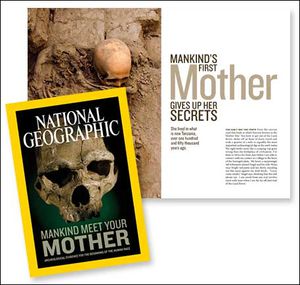National Geographic: Difference between revisions
From Battlestar Wiki, the free, open content Battlestar Galactica encyclopedia and episode guide
(added picture and notes; also "maternal ancestor") |
(added article headline) |
||
| Line 3: | Line 3: | ||
'''''National Geographic''''' is a magazine publication in existence on [[Earth (RDM)|Earth]] 150,000 years after the [[The Fleet (RDM)|Fleet]]'s remnants settle it. | '''''National Geographic''''' is a magazine publication in existence on [[Earth (RDM)|Earth]] 150,000 years after the [[The Fleet (RDM)|Fleet]]'s remnants settle it. | ||
[[Messenger Six]] and [[Messenger Baltar]] read | [[Messenger Six]] and [[Messenger Baltar]] read the cover story from an issue of this periodical, titled "Mankind Meet Your First Mother", held in the hands of a [[Ronald D. Moore|man]]. Said article pertains to the discovery of [[Hera Agathon|remnants belonging to]] the [[w:Mitochondrial Eve|common genetic maternal ancestor]] to life on that planet ([[TRS]]: "[[Daybreak, Part II]]"). | ||
==Notes== | ==Notes== | ||
Revision as of 20:33, 20 March 2010

National Geographic is a magazine publication in existence on Earth 150,000 years after the Fleet's remnants settle it.
Messenger Six and Messenger Baltar read the cover story from an issue of this periodical, titled "Mankind Meet Your First Mother", held in the hands of a man. Said article pertains to the discovery of remnants belonging to the common genetic maternal ancestor to life on that planet (TRS: "Daybreak, Part II").
Notes
- The man reading the magazine is series creator and episode writer Ronald D. Moore.
- While the name of the magazine is never actually seen on screen, the prop was designed by National Geographic's own art department. Ron Moore and David Eick discussed the process that lead to the involvement of National Geographic in an interview with the magazine's blog.